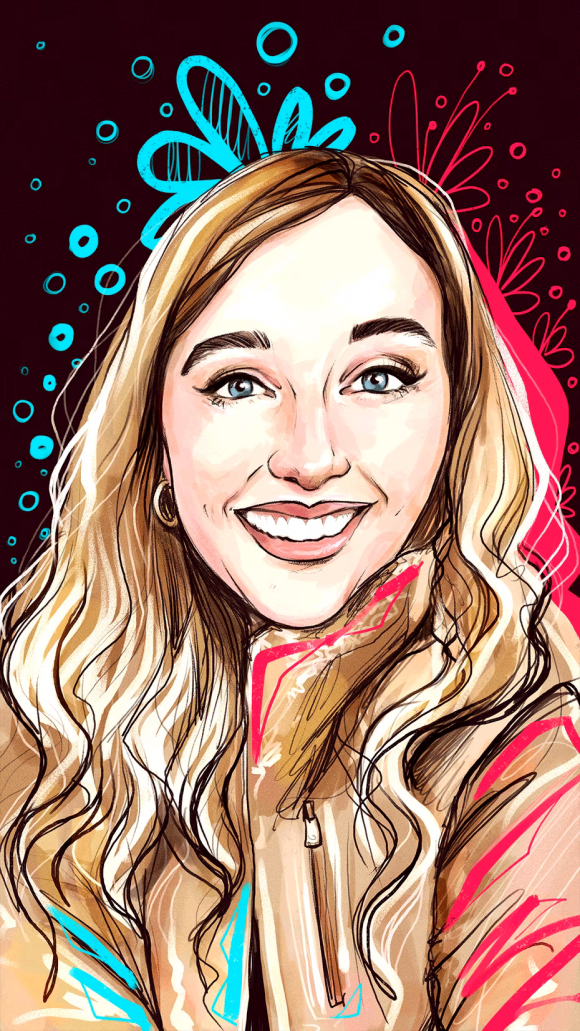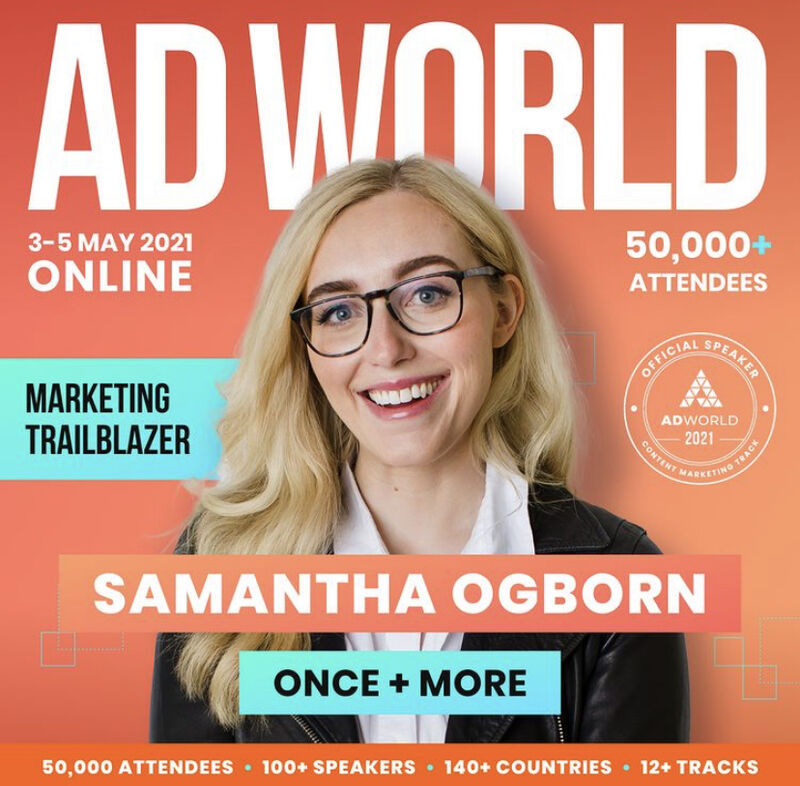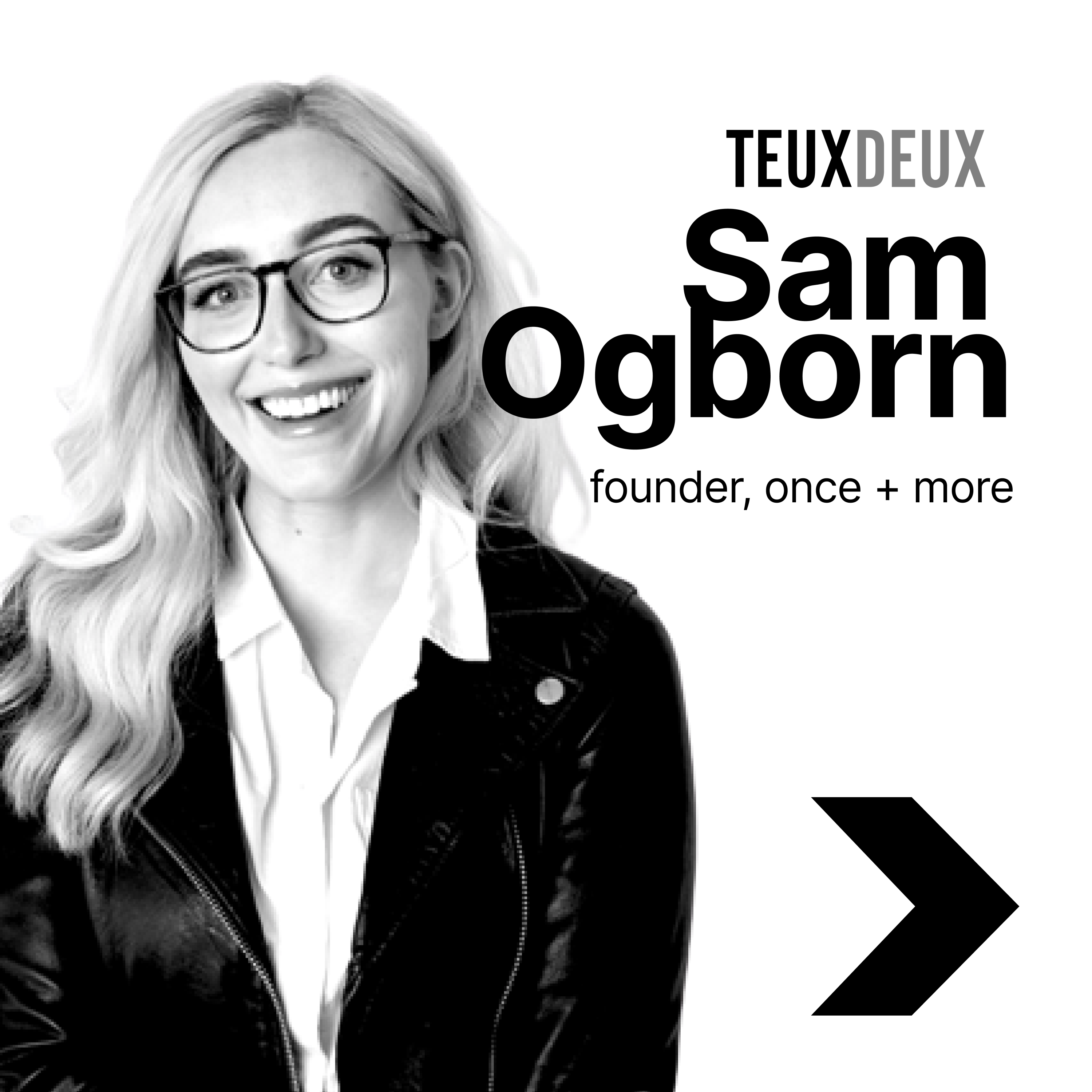Interview with Sam Ogborn:
Our third Someday List interview is with Sam Ogborn, founder & CEO of once+more, and the host of The Next Big Thing, a podcast highlighting female founders. Sam built her career in marketing shaping digital strategy at agencies, startups, and big name companies like Walgreens and Red Bull. We talk about the unique thrills and challenges of working within a legacy brand, how that's led her to building a company that eschews the traditional agency model, and how she's weathered the shifting tides of social media by always staying curious.
Read some of the interview highlights below: Can you tell us a little bit about yourself and your company once in more?
Yeah. So my dream was never to start an agency ever. I remember working for an agency at two agencies and being like, absolutely not. I knew that I wanted to leave the corporate world, like many people, especially after COVID. I was the VP of marketing at a financial services company. And I was bored out of my mind, sorry for anyone listening who worked there with me, but I was bored and they had a voluntary severance program and I raised my hand and then that's when it really became real that I was going to do it.
I always like dabbled in different things because I always love to be a self starter with separate projects. I think a lot of entrepreneurs probably start doing side hustles and have their own little things before they venture out on their own. I felt like after leaving the corporate world, I really found my niche with female founders and just founders in general, who wanted to make a difference in the world. So, that has been my focus.
You started at an agency in business development. At that point, just starting your career, what does the career path ahead of you look like? What did you think you were signing on for?
Oh, I had no idea. I mean really, truly no idea. I think it's one of those things where you just fling your body into the corporate world when you're young and you're just like, "well, hope this works."
I actually have a lot of respect for. Gen Z, because I feel like they're less likely to be patient. As millennials, you go into the corporate world, you work a job for at least two years, and then you move on, you do the next thing. And it's really regimented. And I think with Gen Z, it's kind of fun because they're like, you know what, if I don't like it, then I'm just gone. My first role was a sales role and I took it because I needed a job. Not because I was passionate about sales. I'm horrible at sales. Like, it's my worst. I hate it. I can't stand it. And so during that time, I wedged myself into social by teaching myself social because I knew it was the only way I was going to be able to get out of sales. So I kind of just took a job because it was a paying job. I needed a job after school.
And then the real fun happened when I learned that we had all of this information at our disposal. This is like 2010. I'm not trying to age myself like 2010, 2011. You could really start to learn things, you could just learn by observing what brands were doing. And so I just started to do that. And then I was able to wedge myself more into social media discipline, and that's how I was able to carry my career in that direction.
You've worked at Walgreens. You've worked at Red Bull. How were big brands thinking about social media at the time?
When I worked at Walgreens, it was 2011, 2012? And it was like the wild west, because social media was just so new still. I remember posting just the dumbest stuff. I remember posting memes on the Walgreens page that legally we probably weren't even able to use, and watching how it performed. There was no process. You just did it and you looked at the analytics and then you posted and did things again.
As you know, social media changes so quickly. So at the time, we're selling things into brands like L'Oreal and Maybelline, and a lot of the brands that we sold in the brick and mortar, we were trying to position ourselves as the new e-commerce brand for convenience. Looking back on the trends, a lot of people didn't shop for convenience products online like they do now and so we tried to position ourselves as e-commerce players. And it was interesting because Amazon was nowhere near what it is now. I don't think Walgreens maybe took the best steps, but that was the first taste that I had of how social media can impact sales.

Did you ever face organizational friction with social media being so new?
All the time, like I even laugh about it. At Red Bull, I had one of my colleagues say marketing just sets money on fire. And I always laughed at that because I think in a lot of corporate jobs marketing is seen as just burning ad budget. And I totally get why people would see things like that.
I think when social media first came around, A lot of people questioned how it would drive to the bottom line or on the flip side, they were so excited about social media that they didn't even care if it drove to the bottom line, it was giving them bragging rights internally. So they could say, Oh, we did this really cool project on Facebook. Everyone's motives for social were very different.
I would imagine Red Bull approaches digital strategy, all of that very differently than say a Walgreens. Do you have like a favorite project you've worked on? Cause you were in charge of a pretty large territory, correct?
I first started as a digital marketing manager. Probably the best job I could have ever gotten, because I just loved it. I loved going and training people and having their eyes light up. It was just really, really fun. And after spending some time in that role, I moved to Minneapolis for a little bit. I oversaw sports, brand and culture, which is like music and arts marketing for what Red Bull would call it a small country in the states.
On the outside Red Bull looks like a very, cutting edge brand because they're all about, you know, like extreme sports and giving people memorable experiences. And that is all true, but when it came to the product side of things, as someone that started their career, truly in digital, I noticed that there were almost some discrepancies. I think the issue with Red Bull was that Red Bull had built this brand on experiences and just cool things. But I was really driven, especially with my experience at Walgreens, trying to understand how does digital actually increase product sales. That wasn't necessarily the sexiest conversation to have. It was probably a sexier conversation for me to be like, "let's have this guy fly off a roof."

While you're having these, not conflicting, but maybe competing interests of perpetuating the brand that they wanted and trying to hit these more objective business measures, did that flip the switch in your head of what you started wanting to see out of career?
At that time I was like, okay, this doesn't feel aligned to me really feeling like I'm able to have an impact focusing on one specific goal so I'm going to consider other jobs. I remember interviewing for a job in Seattle. It was at a startup and I had never been to Seattle, but I had told them that I loved it there. And then when they gave me the job offer, I was like, well, shit, I need to go out there and actually see what the city is. I can't take a job without seeing the city, and I went out to Seattle and I just hated it.
So I'm having this career crisis and I had a friend who had worked at Red Bull with me, who worked at a financial services company. And she was like, hey, I know this is really weird. You probably don't want to come work for this company, but there is an opportunity with a startup that's within the company. They have the backing of this financial services brand, but they're a scrappy startup within the company so you'll get to work on this app for travel and entertainment. It was like a buy now, pay later for travel and entertainment.
The team was amazing but it felt like Groundhog's Day once I got there, because there are so many things that we were trying to move forward, we really felt like the trend of buy now, pay later, with Affirm and Afterpay, was really taking off in the industry. Our company had an opportunity to position themselves as a key player, but we constantly could not. The broader company supported it, they were funding the idea so they believed in it, but they became their own worst enemies.
There's so much opportunity to build something transformative, and from a PR standpoint, get out there and really makes some buzz, but it was headache after headache of just trying to sell things in and get approval. And then you had a lot of people internally, similarly to what we talked about with social media, where people were like, are you sure this is going to work? Do people even care about this? And we're like, yes, people care about this!
The sad thing is I remember my boss calling me, and she was like, you know what? I just don't think this idea is going to go through. And I think we need to figure out where we can place you guys internally. And then two weeks later COVID hit. I was so excited to launch this thing and get this thing out the door with the rest of the team and then COVID hit. And then I got reallocated to another team and that's where the boredom really started to set in because it was general purpose credit card. I'm so grateful that I had a job, but it really wasn't what I came there to do.
And so that's when these thoughts of creating my own thing really started because I was like, this is not the path that I wanted for myself. I feel bored, and for me personally, when I feel bored it is like a death sentence.
I was listening to another podcast you did, and your thoughts on the agency model just reminded me of something you had said, it's not necessarily the business model you're concerned with. You are more concerned with empowering others with your agency, once + more.
I think I just realized that there was a way to do things that I wanted to do without operating in that traditional agency model. I've had people say, well, don't you want to scale and take on as many clients as you can? And my thing has always been, absolutely not. I get that that is how the traditional agency model works, but then you lose touch of the people that you're working with and the connections that you've built, and the camaraderie, and the commitment to the results, and that part is just not satisfying to me.
I've had to do things my own way and just go with my gut a little bit more. Working with people who I feel like are open-minded and have clear goals and just want to get to that next step, but also staying super boutique for once + more so that I'm not stretching myself too thin.
So it's a flip on the model that I was used to, but it's actually what I prefer to do more. But I think for a lot of people, they would say, well, that's not really a sustainable business model, or that's not really a model that's going to carry you into the future. And I've just seen how unhappy I can be in the corporate world.
Running your own agency, recording your own podcast, how do you stay organized?
For me personally, I really have to prioritize the personal things that matter to me and time block them. So recently, I mean, I got a little fluffy during COVID, I'm not going to lie. I just wasn't happy about it so I decided to work with a trainer that my friend worked with and I time block that on my calendar now. Also in the morning, I begrudgingly meditate. It's not something that I get excited to do, but I do notice that I'm a lot calmer when I do it.
And so there are certain personal things now that I have to just pencil into my calendar. I am actually not someone that lives and breathes by my calendar either. I am someone that really has to go with the flow because if I force myself to do things, I find myself annoyed. so I'll time block things in the way that makes the most sense and I try to stick to it. But a lot of times, I'm not going to lie to you, I'm a work in progress. I'll see an email pop up and then I'll look at my email and like, I'm really not as focused as I'd like to be, but I also don't think that that's ever a destination that people reach. I think you have to constantly work at it.
So yeah, I'm still figuring that out but at the end of the day, I'm really just someone that goes with the flow. I don't keep slack on my phone. I don't keep my emails on my phone, because I'm a workaholic. If I give myself the opportunity to work, I will work. I probably wouldn't have said that as much in the corporate world, but now that I'm on my own, I just really have fun with it. Like, it's just fun for me. So I have to be very regimented with the hours that I work or else I will go crazy.
In the startup world, you hear from these founders who say they have these crazy processes for things, and I've always wondered, am I just an outlier? Because I don't operate that way. I think it's just better to be candid about the fact that like, Hey, I'm still a work in progress. It's like tending to a garden. I can't leave it on autopilot. And I can't get obsessive about it because either ways are just not going to work for me. And so I have to find a way that it works into my schedule naturally, where it doesn't stress me out.
You know, you read these books like atomic habits and a lot of this startup culture says that everything has to be super focused, super regimented, or you hear like miracle morning where it's like, wake up at 5:00 AM. It's like, I'm just not doing that. I won't do that. So it's like, what works for you? And then don't overdo it. And I just try to go with the flow and listen to my intuition as much as I can. And I find that that usually works the best.
Follow Sam's work:
